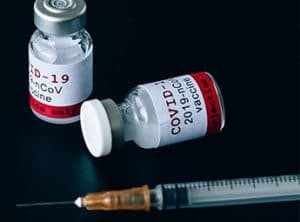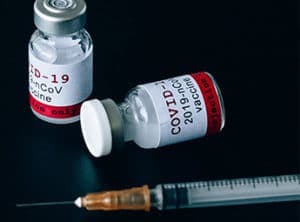Moderna COVID Vaccine Effects On Dermal Filler Patients

Just like buses, after waiting all year for a COVID vaccine to arrive, two have come along at once.
We feel the newer one is particularly worth drawing your attention to. This is because its clinical trial reports that the Moderna COVID vaccine effects on dermal filler patients may include facial swelling.
UPDATE: Please note, the following information was correct at the time of publishing (December 2020). However, there are now (January 2023) more than six COVID vaccines available. Further studies have also explored COVID vaccine effects on dermal filler. At least two of the roster of vaccines have case reports of delayed reactions to dermal filler. There is no evidence that these are related to any particular vaccine, though. At Harley Academy and The Academy Clinic, we have changed our treatment policy to one week pre- and post-vaccine for dermal fillers.
Moderna coronavirus vaccine

The coronavirus vaccine developed by Pfizer/BioNTech is currently being rolled out across the UK and USA. It’s said to have a 94 per cent efficacy rating in people aged 65 years and over.
In America, the Moderna vaccine has also now been authorised for emergency use in adults aged 18 and over by the FDA. Reporting efficacy ratings of 94 per cent at preventing COVID-19 and 100 per cent against severe COVID, it is expected to hit the UK soon. The UK government has reportedly already secured enough of these shots to immunise approximately 3.5 million citizens.
As with the Pfizer shots, the Moderna vaccine is administered in two separate intramuscular doses. These doses are given one month apart. One of the key differences between the two is the temperature at which they must be kept. Pfizer requires its vaccines to be kept at sub-zero temperatures of approximately -70 degrees Celsius throughout the delivery chain. More conveniently, the Moderna option can be stored in a normal refrigerator, which may increase its popularity.
Contraindications, as advised by the company’s website, appear to be minimal. The singular entry states that the vaccine should not be administered to anyone with a “history of severe allergic reaction (eg anaphylaxis)”.
Warnings to immunisers provide additional guidance on the management of immediate, acute allergic reactions when administering the vaccine.
Its clinical trials have turned up some interesting information for aesthetic professionals, however. Specifically, with regard to the Moderna COVID vaccine effects on dermal filler patients.
Facial swelling in cheeks and lips
The list of adverse reactions to the Moderna vaccine is particularly relevant to aesthetics practitioners.
Two of the 155 individuals who took part in Moderna’s clinical trials experienced facial swelling. The swelling was located in their cheeks and lips. Both of these participants had dermal fillers and had experienced similar swelling previously after receiving a different vaccine.
Four cases of Bell’s Palsy were reported among participants. Three of these were vaccine recipients and one received a placebo. There was no mention of any of these patients having dermal fillers.
It is unknown whether any other trial subjects who did not experience any adverse events also had dermal fillers.
What this means for treating filler patients
As we have already advised, it is wise for aesthetic practitioners to adjust their clinical consultation during this time. You will need to add more in-depth questions to establish a true picture of your patient’s mental health; now you will also need to know about their vaccination status.
Establish vaccination status and timeline
In this case, you’ll need to speak to your patient ahead of time. Ideally, do this when they’re booking their appointment. However, it is also worth checking again during your consultation on the day of their appointment.
Ask if they’re scheduled to have the vaccine, or if they’ve had the vaccine. If they are, or have, ask them when, which one and whether they received one or two doses.
Should you discover they’re about to receive either their first or second dose of the Moderna vaccine, you may wish to defer treatment. This is likely to be the best course of action just to be on the safe side, given very little is known about these vaccines yet.
At Harley Academy, our rule for these vaccines will be that patients can be treated with filler either four weeks before the first dose or four weeks after the second dose.
Explain the situation and risks regarding vaccine effects on dermal filler
Clearly explain the risks to your patient. Chances are, they will be happy to rebook for after their vaccination. If they wish to proceed with getting fillers close to their vaccination date, it’s up to you to make an ethical decision as to whether this is in their best interests… And stick to it! We know how persuasive patients can be but don’t let them sway you.
We’ve said it many times before but it bears repeating: let your patient’s welfare, rather than their wishes, guide your decision. Your reputation as a trustworthy, knowledgeable and ethical injector is at stake if you decide to treat someone who then has an adverse reaction to the vaccine as a result of their fillers.
As Moderna is expected to ship all its available doses by the end of 2020, this is unlikely to be an issue before 2021. However, it’s worth introducing these questions now as part of your new ‘best practice’ COVID routine. That way you’ll be ready for the UK vaccine rollout which is expected to extend into Spring 2021. There’s nothing like being prepared!
All information correct at the time of publication. Last updated: 20 January 2023
Download our full prospectus
Browse all our injectables, dermal fillers and cosmetic dermatology courses in one document
By submitting this form, you agree to receive marketing about our products, events, promotions and exclusive content. Consent is not a condition of purchase, and no purchase is necessary. Message frequency varies. View our Privacy Policy and Terms & Conditions
Attend our FREE open evening
If you're not sure which course is right for you, let us help
Join us online or in-person at our free open evening to learn more
Our Partners












STAY INFORMED
Sign up to receive industry news, careers advice, special offers and information on Harley Academy courses and services

